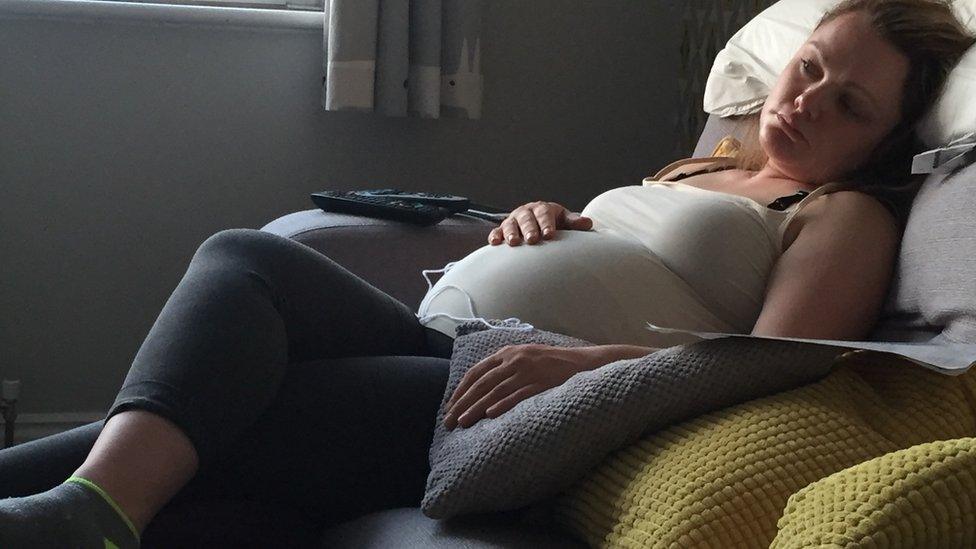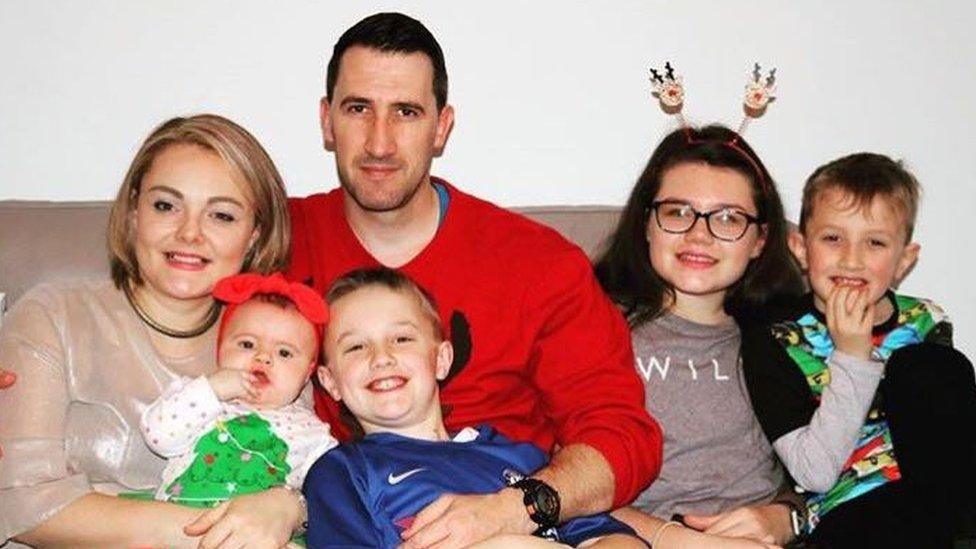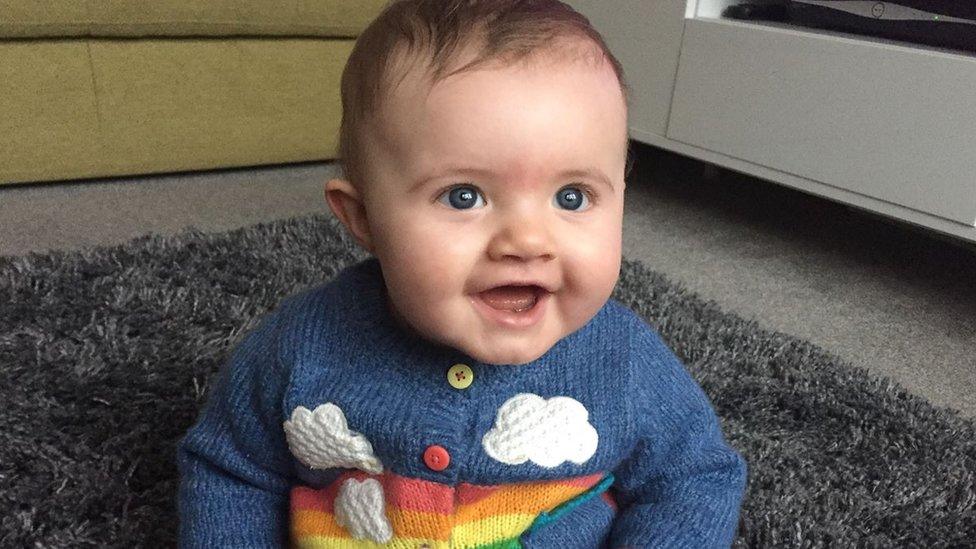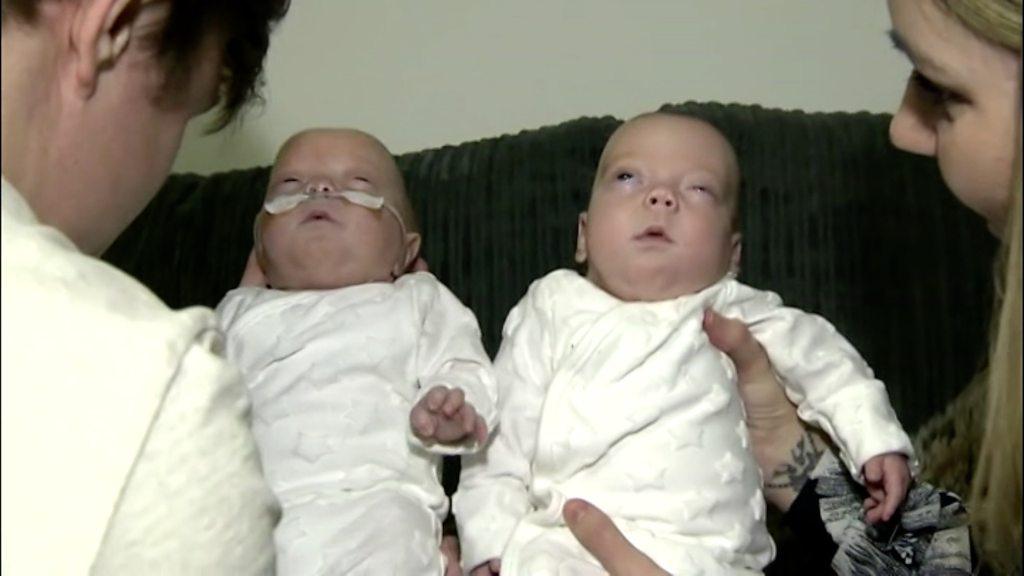Mum's Twin-To-Twin Transfusion Syndrome action call
- Published

Rhiannon: relaxing when she was pregnant
Twin-To-Twin Transfusion Syndrome is a rare condition affecting up to 15% of identical twins in pregnancy. Here, mother Rhiannon Jenkins, 35, a health visitor from Pontypridd, tells of the devastation of losing one baby in the womb while the other survived.
It was December 2016 when I first found out I was expecting identical twins.
My husband Gareth, a firefighter, and I already had three children, and at first the news was slightly overwhelming.
But once the shock had sunk in, we were over the moon.
During the early weeks, I felt worse than in my other pregnancies, with more fatigue and nausea.
But there was nothing to indicate there was anything wrong.
It was at my 16-week scan that I was told my girls had Twin to Twin Transfusion Syndrome or TTTS, a rare and life-threatening condition.
As is the case with most identical twins, mine shared a placenta, which brings blood and nutrients to the babies' umbilical cords.
But with TTTS, blood vessels within the placenta are shared, allowing blood from one twin to be passed to another.
It meant one baby, Isla, the recipient twin, was given too much blood, putting intense pressure on her heart.
Meanwhile, Isabelle, the donor twin, was left with not enough blood and at risk of dying from severe anaemia.
Despite being a health visitor and having a background in children's nursing, I had never heard of TTTS.
But doctors told me 10-15% of identical twins who shared a placenta suffered from it.
Without surgery, we were told the chance of both our girls dying was near 100%.
Surgery
But with surgery, they had a 60% chance of reaching a viable gestation.
We were warned it was complicated, however.
The surgery - called laser ablation surgery - would seal off or cauterise the blood vessels, stopping the blood being passed from one twin to another.
Despite being pioneered in the USA more than a decade ago, it is relatively new here, with just four hospitals offering it around the UK, and none in Wales.
In the February, when I was 18 weeks pregnant, I underwent the surgery in St Michael's Hospital in Bristol.
It was quite unobtrusive - I was awake the whole time, and surgeons just made a tiny incision in Isla's side of the womb and fed the camera and laser through.

The Jenkins family, with their four children
Still, I knew there was a high chance of them both dying within 24 hours, so waiting to hear their heartbeats and find out if my babies had survived was horrendous.
Amazingly, they both had, and my relief was huge.
Scans seemed to show a positive prognosis and we were cautiously optimistic.
But 11 days later, on Valentine's Day 2017, I wasn't feeling well, and a scan revealed Isabelle had suffered a placental bleed and died.
Devastation doesn't describe what I felt. The loss and grief was just overwhelming.
But as horrific as it was, I couldn't really grieve properly or get stressed as I had to stay in the best shape to keep Isla alive.
'Bittersweet'
Thankfully, because the twins' blood supplies had been separated, Isla had been protected.
But it was still touch and go for her and so stressful to see if she would make it.
By 24 weeks, though, the doctors were more positive about her.
And on May 31 last year, I had a planned caesarean, giving birth to both my girls.
Describing the moment as bittersweet is an understatement.
I know I should feel grateful to have Isla, and I am, but the pain of losing Isabelle was indescribable.
Still today, eight months on, I find it awfully hard to accept.

Isla as a healthy baby, after surviving TTTS
I struggle to move on, and miss and ache for her constantly.
Everywhere I look I see twins, and I can't help but wonder why it had to be us.
Because they were identical, as we watch Isla grow, we are constantly reminded that she should have a mini replica beside her.
And it is her that I mostly feel for.
At some stage, she will find out she had a twin sister - it is her loss as much as ours.
Despite the darkness, however, we could have easily lost Isla too, and we are mindful of this.
She is the youngest of four and so precious.
But I want to raises awareness of this condition.
TTTS kills more babies a year than Sudden Infant Death Syndrome (SIDS)- yet it doesn't receive nearly as much publicity or funding for research.
That's why on Sunday, I'll be doing 'Zumbathon' with family and friends to raise money for the Capella Foundation, external, a charity that supports research into TTTS and other medical complications in pregnancy.
I'll also be running the St David's Day 10K, external on March 4 in Cardiff.
Ultimately, there needs to be more research into all serious conditions affecting pregnancies, as this is the only way we will stop future deaths.

WHAT IS Twin-to-Twin Transfusion Syndrome (TTTS)
Twin-to-Twin Transfusion Syndrome is a rare but life-threatening condition that affects 10 to 15% of identical twins who share a placenta.
If untreated, upwards of 90% of babies are likely to die. Of those who do survive, there is a chance they will suffer from a disability or health condition.
It is not known why TTTS occurs and there is a lack or research into the condition.
According to Tamba, external, the Twins and Multiple Births Association, around 300 babies die of TTTS in the UK each year.
- Published13 December 2017
